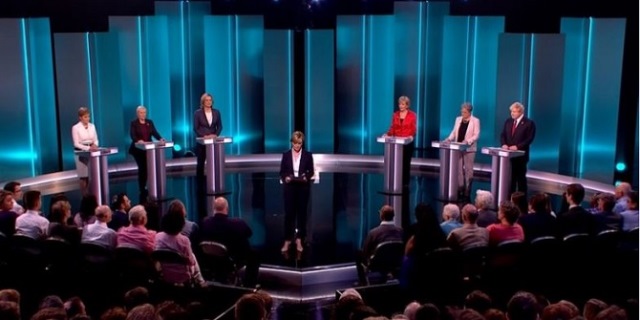What did ITV’s EU referendum debate say about the role of women in the campaign?
The impact of EU membership on women has not played a major part in the UK’s referendum campaign. Following a TV debate on 9 June that featured five female politicians, as well as Boris Johnson, Roberta Guerrina assesses how the EU has affected factors such as women’s employment rights and how these issues could be better covered in the wider debate about Brexit.

A rare occurrance of a female-dominated panel: members of the ‘Remain’ and ‘Leave’ camps clash in the ITV Referendum Debate on 9 June 2016. (via itv.com)
The second ITV EU Referendum debate, held on 9 June, was once again set up to showcase the key arguments of the campaigns. Interestingly, after several weeks of campaigning where women played largely a supporting role, the debate was female dominated. It featured an all female line-up for the Remain side with Nicola Sturgeon of the SNP; Angela Eagle from Labour; and Amber Rudd from the Conservatives, whereas the Leave side put forward Andrea Leadsom (Conservative) and Gisela Stuart (Labour) alongside Boris Johnson.
At a symbolic level, women’s contribution to the debate demonstrates competency on key issues beyond traditional “women’s issues”. The focus of the debate on issues of “high politics” breaks from the pattern of the current campaign, and provided a platform for female political leaders to demonstrate their competency in core areas, e.g. security, economic policy and migration. This is significant because both campaigns have thus far relegated women’s contributions largely to the “gender” silo.
Women in the referendum campaign
As the polls indicate that the campaign is becoming an increasingly tight contest, it is unsurprising that both sides are now going all out in the last two weeks before the vote to try to secure the support of undecided voters. We have known for a while that women are more likely to claim they are undecided about their position. Is this a sign that the campaigns are finally reaching out to women as political leaders and voters?
Certainly, showcasing leading female figures in the campaign can be seen as a way to bridge the gender gap and secure the support of female voters. But the actual debate and the positions presented did not break the pattern of the campaign: Remain focused on the economy and trade, whereas Leave presented fairly well rehearsed arguments about immigration. The campaigns traded in counter arguments, staking their claims based either on rational choice arguments based on economic gains, or emotive/identity based arguments that implicitly link unemployment and migration. Nothing new here.
What was new was the inclusion of a question on the impact of Brexit on women’s employment rights. Remain has been trying to engage in a discussion of the impact of the EU on the development of equality legislation for a while, but Leave has largely dismissed these arguments by focusing on the UK’s track record before membership of the Common Market. This is the first time that both campaigns moved beyond soundbites and started to disentangle the complex relationship between the UK and the European equality framework.
It is indeed true that the UK ratified equality legislation (the 1970 Equal Pay Act) before joining the Common Market. It is also true that working class women campaigns increased awareness of working conditions and the impact of inequality on different groups of women. However, we should not dismiss the political imperatives of a requirement to implement the European acquis ahead of joining the Common Market.
A nuanced and detailed discussion of the relationship between the UK, the EU and its institutions requires a detailed assessment of the EU’s institutional structure and the role played by the UK in shaping European social and economic provisions. The neo-liberal drive of the UK to promote de-regulation at the European level should not be overlooked in our assessment of the influence of Europe on national socio-economic policies and regulations.
The question that remains is to what extent the debates have addressed the wide spread knowledge deficit that exists about the European Union. Although the quality of the ITV debate was higher than what we have seen thus far, it still highlights the difficulty of engaging in a popular discussion about such a complex organisation which requires a detailed understanding of institutional structures. Ultimately, what these debates highlight is the absence of a European public space and the need to enhance pathways to political engagement and participation for all demographic groups.
—
Note: This article originally appeared on EUROPP – European Politics and Policy. Please read our comments policy before commenting.
—
 Roberta Guerrina is Reader in Politics at the University of Surrey.
Roberta Guerrina is Reader in Politics at the University of Surrey.





 Democratic Audit's core funding is provided by the Joseph Rowntree Charitable Trust. Additional funding is provided by the London School of Economics.
Democratic Audit's core funding is provided by the Joseph Rowntree Charitable Trust. Additional funding is provided by the London School of Economics.
[…] https://www.democraticaudit.com/?p=22609 […]
What did ITV’s #EUreferendum debate say about the role of women in the campaign? https://t.co/u4fTnzMlbV #EUref
What did ITV’s EU referendum debate say about the role of women in the campaign? https://t.co/VQkpWWt1vY
[…] Democratic Audit Campaign: What did ITV’s EU referendum debate say about the role of women in the campaign? […]
What did ITV’s EU referendum debate say about the role of women in the campaign? https://t.co/cgUcXaDs3H
What did ITV’s EU referendum debate say about the role of women in the campaign? https://t.co/u4fTnzMlbV
[…] https://www.democraticaudit.com/?p=22609 […]
What did ITV’s EU referendum debate say about the role of women in the campaign? https://t.co/UlCNydWEPn
What did ITV’s EU referendum debate say about the role of women in the campaign? https://t.co/UDOetX4sqc
What did ITV’s EU referendum debate say about the role of women in the campaign? https://t.co/qT8XIJxuVQ
What did ITV’s EU referendum debate say about the role of women in the campaign? https://t.co/o9HP2jpBMt https://t.co/ZiFRznqihy